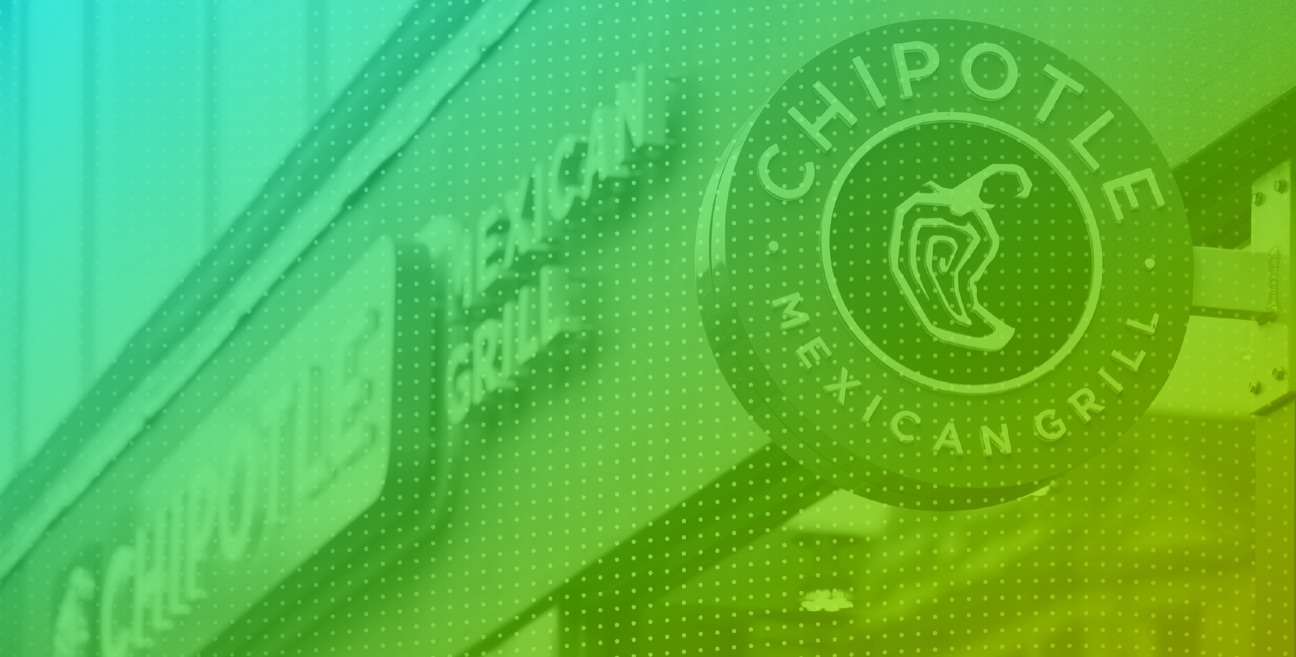Chipotle is one of the most intimate fast food brands in our 2017 Brand Intimacy Study. It’s also one of the most interesting. The brand has been viewed as a pioneer of fast casual dining, rapidly rising to the top of the industry by delivering quality and convenience at a reasonable price. It has also suffered from damaging controversies (both recent and from years past) that have challenged the brand in recent times. Following Starbucks, Chipotle is the #2 fast food brand and ranks 64th in the study overall (out of nearly 200 brands) with a Brand Intimacy Quotient of 30.8. That means Chipotle is more intimate than McDonald’s, Pizza Hut, Subway, Domino’s, Wendy’s, and Dunkin’ Donuts, to name a few.
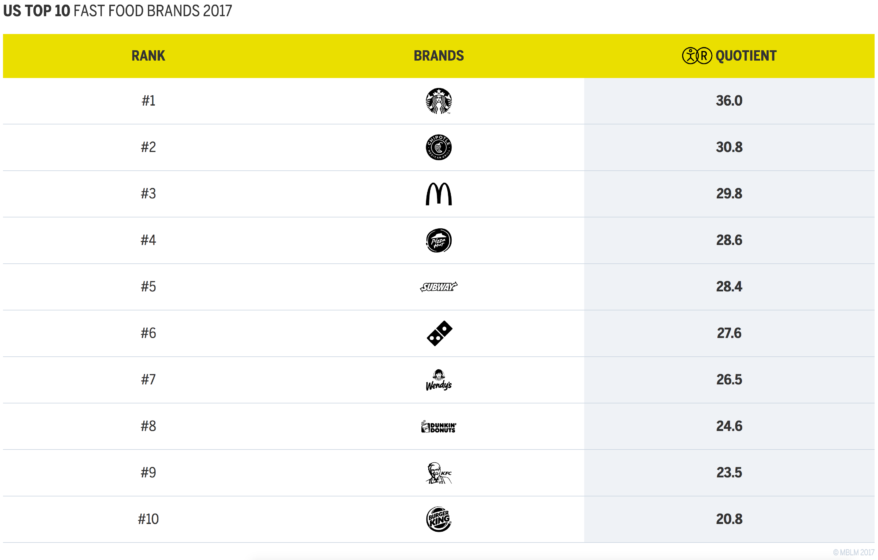
Over the past several years, Chipotle has exploded in popularity and achieved widespread appeal, growing from 16 locations in 1998 to 500 in 2005 and 2250 in 2017, albeit with some food safety catastrophes along the way. After the notorious 2015 outbreaks of E. coli and norovirus, from which the brand had just started to recover, Chipotle now finds itself in the summer of 2017 amidst two more similarly damaging scandals, with yet another norovirus outbreak and an incident of rats falling from the ceiling of a Dallas location.
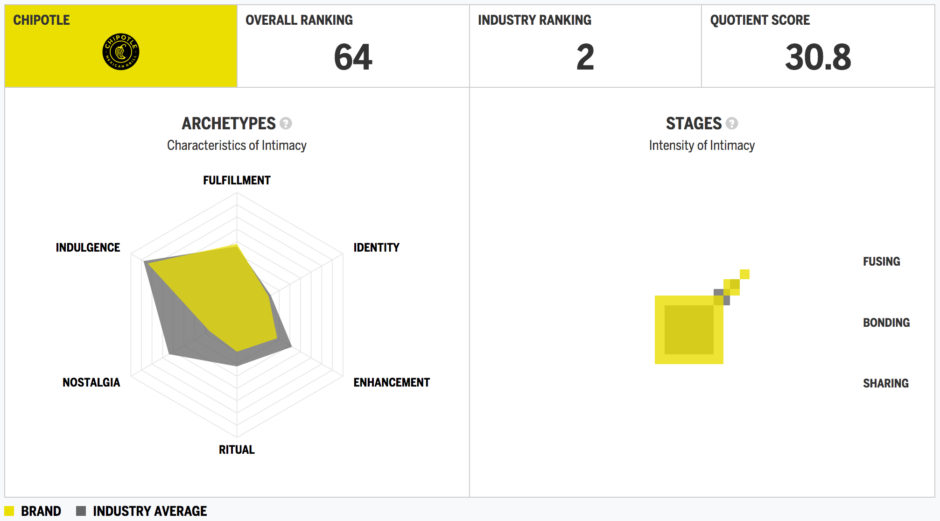
This complicated food safety history, along with interesting data from our study (which were collected before the aforementioned 2017 events), make Chipotle somewhat of an enigma, so we investigated the fast casual giant to try to make sense of it all from a Brand Intimacy perspective. Here’s what we found:
Keeping It (Fast) Casual
According to our Brand Intimacy findings, Chipotle has an impressive number of customers experiencing intimacy, but mostly in the earliest stage (i.e., sharing). The stages of Brand Intimacy measure the depth and intensity of brand relationships, and Chipotle leads the fast food industry for customers in the first stage, sharing, with 21 percent. Chipotle’s success in the sharing stage likely has something to do with the fact that the brand has seen explosive growth while still being relatively new to the category. Most consumers haven’t known Chipotle for long, and many will probably grow more intimate with the brand as time goes on.
This profile of more sharing customers is not uncommon for “newcomers” in our Brand Intimacy Study. The #5 brand overall, Netflix, has an average rate of customers in the fusing stage but far exceeds category averages for the sharing and bonding stages. Ben & Jerry’s also has a high rate of sharing and average or below average performance in the advanced stages. Even though Chipotle’s rates for the deeper stages (i.e., bonding and fusing) are average, the brand’s strength in the sharing stage gives it the highest percentage of customers experiencing intimacy in the fast food category.
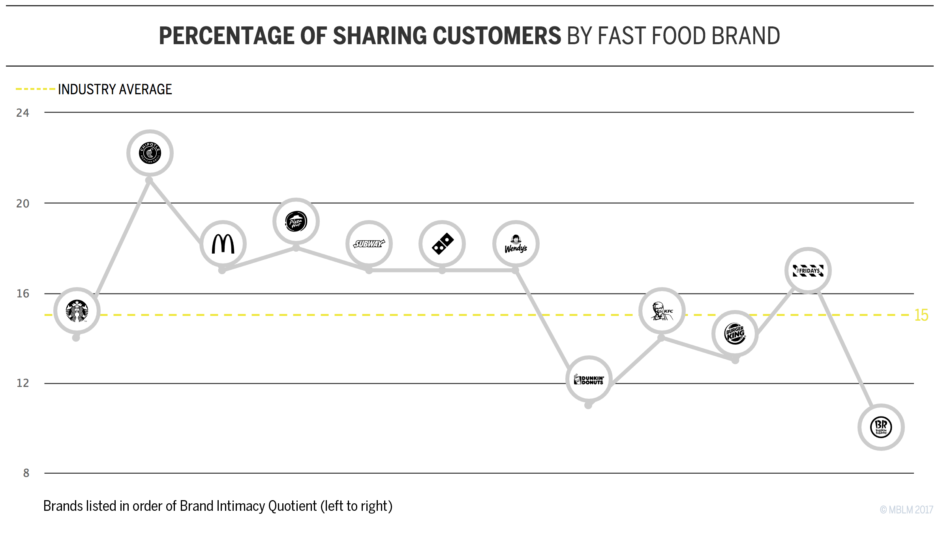
It is also possible that the brand’s well publicized food safety issues in 2015 have made customers reluctant to form deeper attachments to Chipotle. Although the sharing stage is when a brand and consumer get to know one another and interact, it doesn’t reflect a strong commitment like the bonding stage, or co-identification like the fusing stage. Chipotle must assure its customers that the brand is trustworthy so that more of them will begin to transition into the later stages of intimacy.
Can’t Work Up An Archetype
In addition to measuring the depth of Brand Intimacy in our study, we also characterize the bonds being formed using six archetypes, or patterns, that identify the character or nature of brand relationships. What’s unusual about Chipotle is that it is the second-most intimate fast food brand, and yet, it scores below the industry average for every archetype except fulfillment (29 vs. 28), which relates to exceeding expectations and delivering superior service and quality.
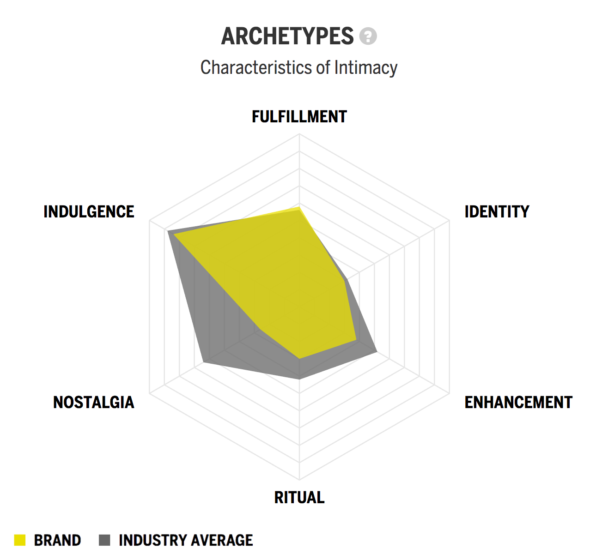
Low archetype scores for a relatively high-ranking brand indicate that although consumers are connecting with the brand, they are not forming strong associations with it. This could be related to the Chipotle’s youth, but, more importantly, it says something about how the brand communicates and the resulting consumer perceptions. Shouldn’t a fast food brand that defines itself by its commitment to “Food With Integrity” have an above-average score on the identity archetype, which characterizes a brand as having aspirational values or beliefs? Shouldn’t a brand that goes above and beyond the standards of a typical fast food chain score much higher on the fulfillment archetype?
If these associations aren’t resonating with customers, there may be a disconnect between what Chipotle says and what it does. This could prevent Chipotle’s customers from forming personal bonds with the brand and weaken its intimacy in the long term. For many consumers, Chipotle’s health safety problems epitomize this disconnect. If the Food With Integrity company can’t serve safe food, what is the brand worth? If Chipotle says it’s dedicated to avoiding another outbreak, but two incidents occur a year and a half later, something is wrong.
Promoters Aplenty
One area in which Chipotle excels is the net promoter score (NPS). With a NPS of 26 percent, it has the second-highest score in the industry behind Dunkin’ Donuts (36 percent). Seeing as how the NPS is a reflection of customer satisfaction, it is one of the strongest aspects of Chipotle’s brand. This satisfaction may be connected to the brand’s solid fulfillment score and to how it is able to grow so rapidly despite spending little on advertising.
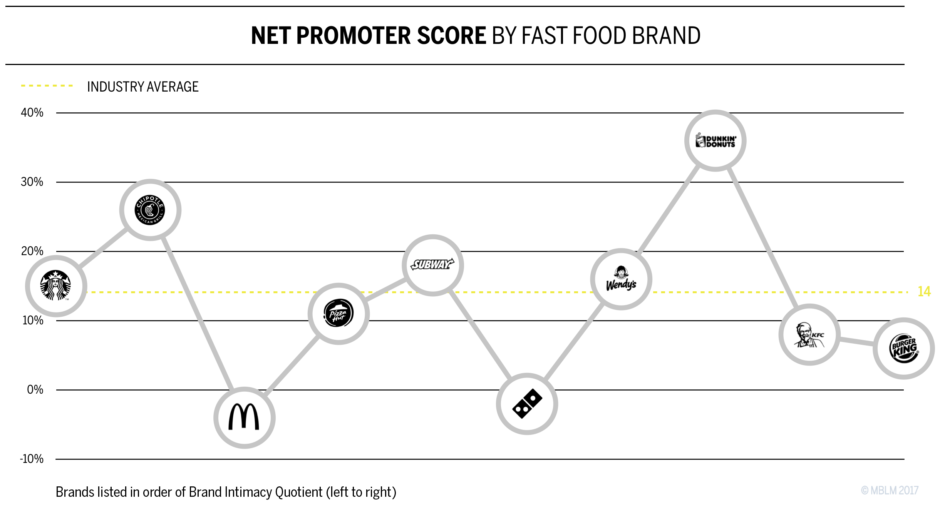
Despite the 2015 incidents, customers are still likely to recommend Chipotle to others; evangelism like that will come in handy in the coming months as Chipotle tries to recover. It’s difficult to say whether or not this loyalty will maintain (or whether word-of-mouth will begin to work against them), but if the brand’s NPS is any indication of customers’ willingness to forgive and forget, Chipotle may bounce back and (hopefully) learn from its mistakes.
To Wrap Things Up
Although it has a mixed Brand Intimacy profile, Chipotle still has a lot going for it. It ranks second in an industry full of much older, globally dominant brands. It has more customers in the stages of intimacy than any other fast food brand. It ranks first among men for the fast food category. It has an impressive NPS, and it performs well with millennials. Still, it will take time to recuperate from this second wave of food safety scandals.
Other than the obligatory apology and commitment to better training and communication regarding outbreak prevention procedures, Chipotle seems to be turning the conversation toward new innovations in its restaurants. Already, the brand is testing a new queso that seems to be getting consumers excited. It has also announced its first drive-thru location and is working on a new mobile app for an improved customer experience. New offerings like these will help create positive buzz around the brand, bring in new audiences, and justify its higher prices, but in order to get out from under the shadow of the recent norovirus outbreak and rat incident, Chipotle will need to make changes to create and maintain Brand Intimacy among consumers. It needs to start putting its money where its mouth is and prove that its seriously committed to providing food with integrity.
Get an overview of Brand Intimacy here.
Read our detailed methodology here and review the sources cited in this article here. Our Amazon best-selling book is available at all your favorite booksellers. To learn more about our Agency, Lab, and Platform, visit mblm.com.
